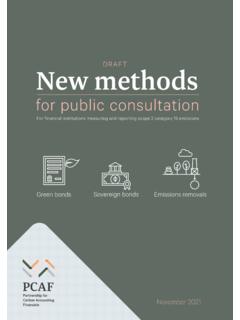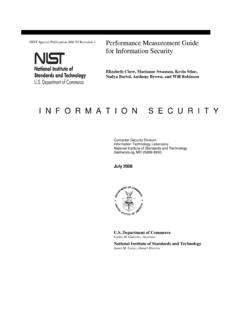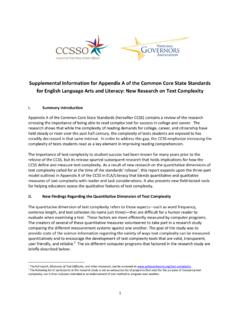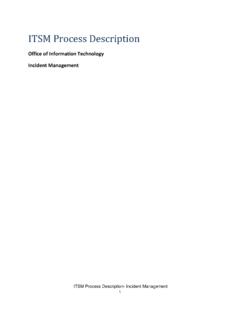Transcription of The GLOBAL GHG ACCOUNTING Standard
1 The GLOBAL GHGACCOUNTING& REPORTINGFOR THE FINANCIAL INDUSTRY Standard2 GLOBAL GHG ACCOUNTING and Reporting Standard for the Financial IndustryThis Standard has been reviewed by the GHG Protocol and is in conformance with the requirements set forth in the Corporate Value Chain (Scope 3) ACCOUNTING and Reporting Standard , for Category 15 investment cite this document as: PCAF (2020). The GLOBAL GHG ACCOUNTING and Reporting Standard for the Financial Industry. First 18, 2020 The GLOBAL GHGACCOUNTING& REPORTINGFOR THE FINANCIAL INDUSTRY Standard3 GLOBAL GHG ACCOUNTING and Reporting Standard for the Financial IndustryIntroductionC H A PT E R 1C H A PT E R 2 Understand what GHGaccounting isIdentify businessgoalsC H A PT E R 3C H A PT E R 4 Reviewaccounting and reporting principlesand rulesC H A PT E R 5 Review and apply ACCOUNTING methodologies for each asset classReport emissionsC H A PT E R 6 Table of contents Acknowledgements 4 Foreword by the PCAF Steering Committee 6 Foreword by Mark Carney 7 Executive summary 81.
2 Introduction 112. The importance of GHG ACCOUNTING 183. Using GHG ACCOUNTING to set and achieve business goals 244. Principles and requirements of GHG ACCOUNTING for financials GHG ACCOUNTING requirements derived from the GHG Protocol s principles Additional requirements for ACCOUNTING and reporting financed emissions 355. Methodology to measure financed emissions Listed equity and corporate bonds Business loans and unlisted equity Project finance Commercial real estate Mortgages Motor vehicle loans 896. Reporting recommendations and requirements 977.
3 Glossary 1058. Acronyms 1109. References 11310. Annex 11618-11-20204 GLOBAL GHG ACCOUNTING and Reporting Standard for the Financial IndustryAcknowledgements In September 2019, the Partnership for Carbon ACCOUNTING Financials (PCAF) was launched globally to harmonize greenhouse gas (GHG) ACCOUNTING methods and enable financial institutions to consistently measure and disclose the GHG emissions financed by their loans and investments. These emissions are also called financed emissions or portfolio climate impact. As an industry-led partnership, PCAF is governed by a Steering Committee of ABN AMRO, Amalgamated Bank, ASN Bank, the GLOBAL Alliance for Banking on Values, Morgan Stanley, NMB Bank, Triodos Bank, and a representative from the United Nations (UN)-convened Net-Zero Asset Owner Alliance.
4 At the time of publishing this document, more than 85 banks and investors participate in Out of this group, 16 volunteered to form the PCAF Core Team to co-create the GLOBAL GHG ACCOUNTING and Reporting Standard for the Financial Industry with the ultimate goal of harmonizing greenhouse gas ACCOUNTING . The PCAF GLOBAL Core Team is depicted below:1 The full list of PCAF participants can be found at: #overview-of-institutionsThe PCAF Secretariat facilitated the Core Team s work by moderating their technical discussions, reviewing the content, and compiling and editing this document. The PCAF Secretariat is operated by Guidehouse, a GLOBAL consultancy firm specialized in energy, sustainability, risk, and compliance for the financial to the process of developing the GLOBAL GHG ACCOUNTING and Reporting Standard for the Financial Industry include Barclays, the Green Climate Fund, the General Council for Islamic Banks and Financial Institutions, and other organizations.
5 As observers, these financial entities were proactively informed and involved in the development process of the GLOBAL GHG 5 GLOBAL GHG ACCOUNTING and Reporting Standard for the Financial IndustryAccounting and Reporting Standard and had the opportunity to provide input and feedback. Observers participation does not imply official endorsement nor commitment to PCAF. Throughout the development of the GLOBAL GHG ACCOUNTING and Reporting Standard (October 2019-November 2020), PCAF engaged with civil society organizations to consider their ideas, discuss PCAF methodological approaches, and receive feedback.
6 During August and September 2020, PCAF also held a public consultation with financial institutions, policy makers, data providers, consultants, and nongovernmental organizations (NGOs).This Standard has been reviewed by the GHG Protocol and conforms with the requirements set forth in the Corporate Value Chain (Scope 3) ACCOUNTING and Reporting Standard for Category 15 investment activities. 6 GLOBAL GHG ACCOUNTING and Reporting Standard for the Financial IndustryForeword by the PCAF Steering CommitteeAs the urgency of the climate emergency grows with still-rising GLOBAL greenhouse gases and proliferating physical impacts, increasing efforts are now being directed at how to prepare the GLOBAL financial system to manage carbon risks and bring solutions to the climate challenge, by bringing emissions down to is against that back drop that, as members of the Steering Committee for the Partnership for Carbon ACCOUNTING Financials (PCAF)
7 , we have been building what we believe to be an essential and crucial component of the broader climate finance ecosystem. Since our GLOBAL launch in September 2019, there has been a surge of interest from banks and investors worldwide to have a clear and transparent set of rules to measure their financed emissions to assess risk, manage impact, meet the disclosure expectations of important stakeholders, and assess progress to GLOBAL climate owe the globalization of PCAF to the pioneering work of the Dutch financial industry. In 2015, fourteen Dutch financial institutions, led by ASN Bank, started the journey to develop methods to understand their portfolios contribution to climate change they strongly believed that measuring financed emissions would enable them to take informed actions to decarbonize their portfolios in order to minimize climate risks and maximize opportunities.
8 They were right. By measuring financed emissions, they were able to identify carbon-intensive hotspots and develop innovative low carbon products for their clients and investees. Their work reveals that measuring financed emissions is the cornerstone of informed climate actions. It is one of the first steps any financial institution should take when embarking upon a process to understand climate risks and opportunities and assessing portfolio alignment in the context of the Paris PCAF Netherlands success led to the uptake of greenhouse gas ACCOUNTING methods by North American financial institutions in 2018.
9 After being tried and tested in the Netherlands, Canada and the United States, and bolstered by a public commitment from pioneers of values-based banking from all corners of the world to adopt this approach, many other financial institutions around the globe began to inquire about how this experience could be applied in other listened to our peers and understood that it was time to have harmonized methodologies to measure financed emissions that can be used by financial institutions of various sizes and with diverse models wherever they are in the world. The GLOBAL GHG ACCOUNTING and Reporting Standard that you are about to read is a response to this GLOBAL Standard is the result of the tenacious work of financial institutions who are part of the PCAF GLOBAL Core Team, who volunteered their time to create thank the William & Flora Hewlett Foundation and the Ikea Foundation for their generous support of this work, we thank the institutions we work for who provided us with the time to work on something that is of benefit to the industry as a whole, and we thank the hundreds of financial institutions.
10 Governmental and nongovernmental organizations who have helped bring this important idea to PCAF Steering CommitteeTjeerd KrumpelmanIvan FrishbergJeroen LootsJames NivenSean WrightDinesh DulalLizzy EilbrachtPeter SandahlUN-convened Net-Zero Asset Owner Allianceforthcoming representative of the7 GLOBAL GHG ACCOUNTING and Reporting Standard for the Financial IndustryForeword by Mark CarneyTo achieve net zero emissions by 2050, we need a whole economy transition - every company, every bank, every insurer and investor will have to adjust their business models, develop credible plans for the transition and implement them.



